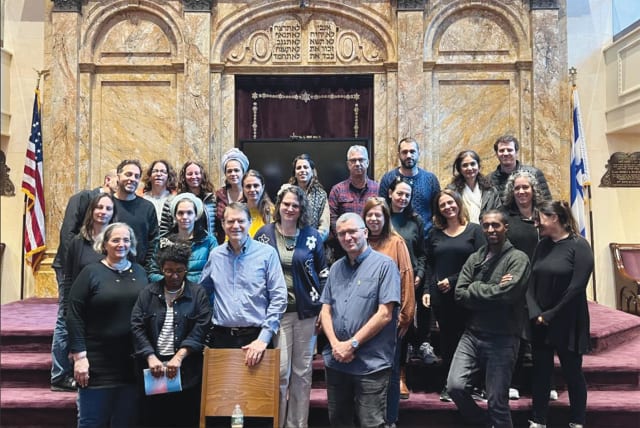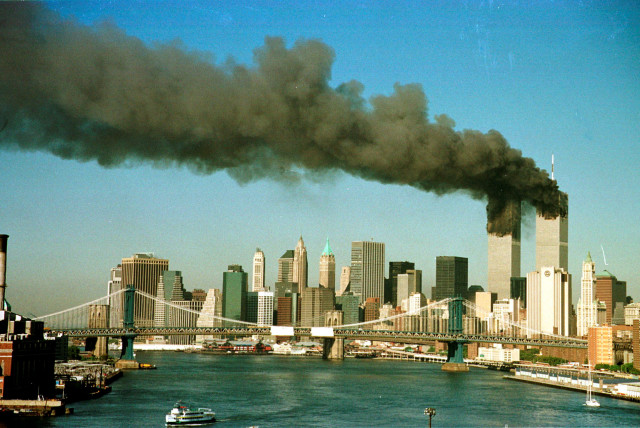Israeli educators can learn from delegation visit to 9/11 memorial following Oct. 7

What can Israeli educators learn from a visit to the memorial for the victims of 9/11?
Since October 7, Israelis have been grappling with the question of what commemorations and memorials would be most appropriate to mark this painful period in Israeli and Jewish history.
Twenty-three educational consultants from Israeli schools working with Schechter Institute’s TALI program recently spent a week in New York City, where they turned to Ground Zero and its 9/11 Memorial for inspiration and guidance.
Through this visit, meetings, and programs with Jewish leaders, institutions, and members of the Jewish community, they also deepened their knowledge of and relationship with the American Jewish community. The delegation returned to Israel on Tuesday with new ideas and insights.
The insights the delegation came back with
The diverse participants work in youth villages (boarding schools) throughout Israel’s periphery, striving to empower teens and build their leadership skills. The consultants are part of TALI, the Hebrew acronym for “Enhanced Jewish Studies,” Israel’s largest pluralistic in-school Jewish studies program, which provides educational programs and resources to 65,000 children in diverse communities throughout Israel.
The consultants began planning their trip to New York before October 7. At the time, the visit was intended to be the culmination of six months of study, during which they explored issues of Jewish and Israeli identity. Through readings and discussions of Zionist literature, Israeli culture, and a visit to a major world Diaspora community, the participants would be better equipped to serve their students.
Then, after October 7, the trip’s viability was uncertain.
“The trip itself is a little bit of a miracle,” reported Dr. Peri Sinclair, the Susan and Scott Shay TALI director-general of the Schechter Institute. “We started planning the trip before Sukkot, and it was a big question mark!”
In a conversation just hours after arriving in New York, Sinclair noted that she hoped the trip would “expose participants to the vitality and creativity” of the Diaspora Jewish community, help them see “common ties,” and “see what inspiration they could bring home.”
Sinclair described the trip as “a bit of a reverse solidarity mission.” She observed, “The international hug Israel has felt after 10/7 has been very powerful. Everyone realized we need to put more into our relationships worldwide.”
Sinclair hoped the group – many of whom were in the United States for the first time – would experience firsthand the pluralism TALI holds as a core value, and that they would come back to Israel “with action steps.”
The visit to Ground Zero and the 9/11 Memorial would be an important part of the process of considering the role of memorials and monuments in Israel post-10/7. Sinclair pointed out that “lots of Israelis see 10/7 as Israel’s 9/11. They realize how horrendous 9/11 was, and want to bridge from their experience to ours.”
Sinclair, an Israeli who earned her doctorate in the US and has previously visited Ground Zero, was hopeful about the impact and meaning of the group’s visit. Yet she acknowledged, “I don’t know what to expect. Going after our 10/7 will be different. It is not just paying respects. It is part of our processing what happened to us.”
Rivka Greenfield, TALI’s director of pedagogy research and development, hoped the group would “see how Americans dealt with 9/11 and how they educate children.”
She noted that “for the past six months, we have been feeling it in our flesh, and we want to go [to New York] because [what we are experiencing] is part of an international war.”
The visit to Ground Zero, on a busy day for the delegation, as it took place between visits to the Lower East Side and the UJA-Federation of New York, began with a ceremony organized by two group members. Each participant received both a yellow ribbon pin, which in Israel has become a symbol of identification with those held in captivity, and a white 9/11 Memorial bracelet.
Together, the group members engaged in a text study and discussed the roles memorials and monuments play in the US and in Israel.
Sinclair later recounted powerful discussions the group had engaged in. Some of the group members were struggling with “not wanting their children [who live near the Gaza border area] to have to drive daily to school through a monument.” Others noted the need “to make space and fill a void with positive actions, by not being victims, and yet remember that there is evil in the world.”
THE VISIT to Ground Zero and the US had a strong impact on the participants, who are still processing the experience and figuring out what to incorporate into their teaching back home.Dotan Levi, head of education at Derech Kfar near Atlit, movingly described his journey from Israel to Ground Zero.
“We left family and friends in a bloody Israeli reality and set out to discover our people and, to a large extent, to meet ourselves with questions of identity, belonging, and meaning.
“When we arrived at Ground Zero, the intensity of the memory of the terrible deaths came to life. Wearing yellow pins to remember that 186 days have passed and the hostages are still in Gaza, and a white bracelet bearing the memory of those who perished in the Twin Towers disaster, we wondered about the relationship between the Jewish people and the world and what is the right thing to do: to continue to increase the light and to concentrate the Jewish and world effort, or is it right to fight the darkness and remember that there is evil in the world and we need to fight it?
“Antisemitism and terrorism are not a danger to the Jewish people; they are a danger to hope, a danger to the world. Anyone who strives for good should stand on the side of good, on the side of Israel.”
Morit Agmor-Avraham, head of professional development for Derech Kfar, reflected on her visit with many people and institutions in the New York Jewish community. “American Jewry provides us with a hall of mirrors for ourselves, for who we are as individuals, as family members, and as a nation,” she noted.
The impressive and thoughtful group was well received by Jewish educators in New York, who were impressed and moved by their visit.
Dr. David Bryfman, CEO of The Jewish Education Project, noted their curiosity. “What an absolute privilege to be able to interact with a cross section of some of the very best of Israeli society. These educators are so committed to their profession and education that they really offer hope for a brighter future in a post-October 7 world.”
On Friday, April 12, just before Shabbat, the delegation met with Rabbi Avi Orlow, vice president of innovation and education at the Foundation for Jewish Camp.
Instead of a well-deserved restful Shabbat, group members prepared for a range of Shabbat programs and experiences, before a final day of touring on Sunday and departure from New York on Monday night.
What will the delegation bring back to Israel? “I don’t think they know yet,” Sinclair noted honestly. “Most are still processing.”
Jerusalem Post Store
`; document.getElementById("linkPremium").innerHTML = cont; var divWithLink = document.getElementById("premium-link"); if (divWithLink !== null && divWithLink !== 'undefined') { divWithLink.style.border = "solid 1px #cb0f3e"; divWithLink.style.textAlign = "center"; divWithLink.style.marginBottom = "15px"; divWithLink.style.marginTop = "15px"; divWithLink.style.width = "100%"; divWithLink.style.backgroundColor = "#122952"; divWithLink.style.color = "#ffffff"; divWithLink.style.lineHeight = "1.5"; } } (function (v, i) { });

